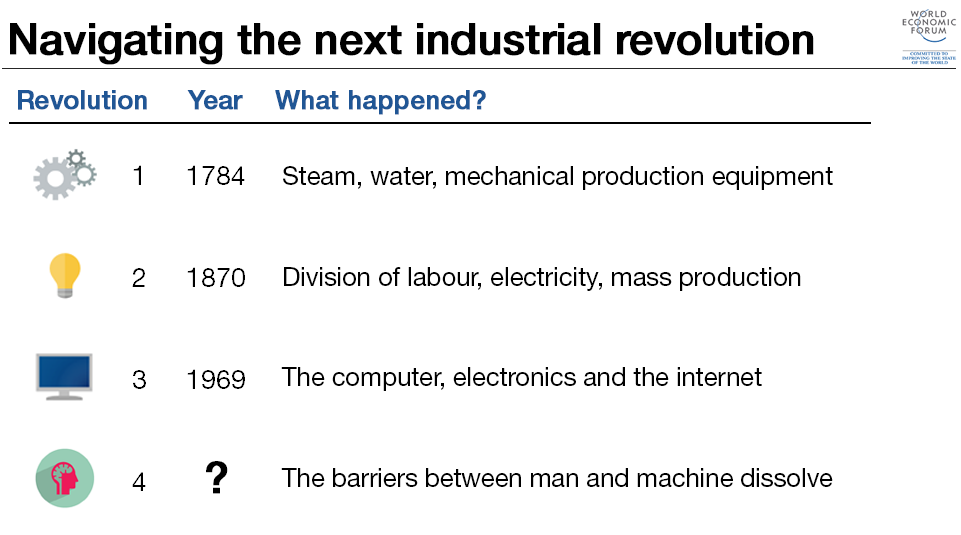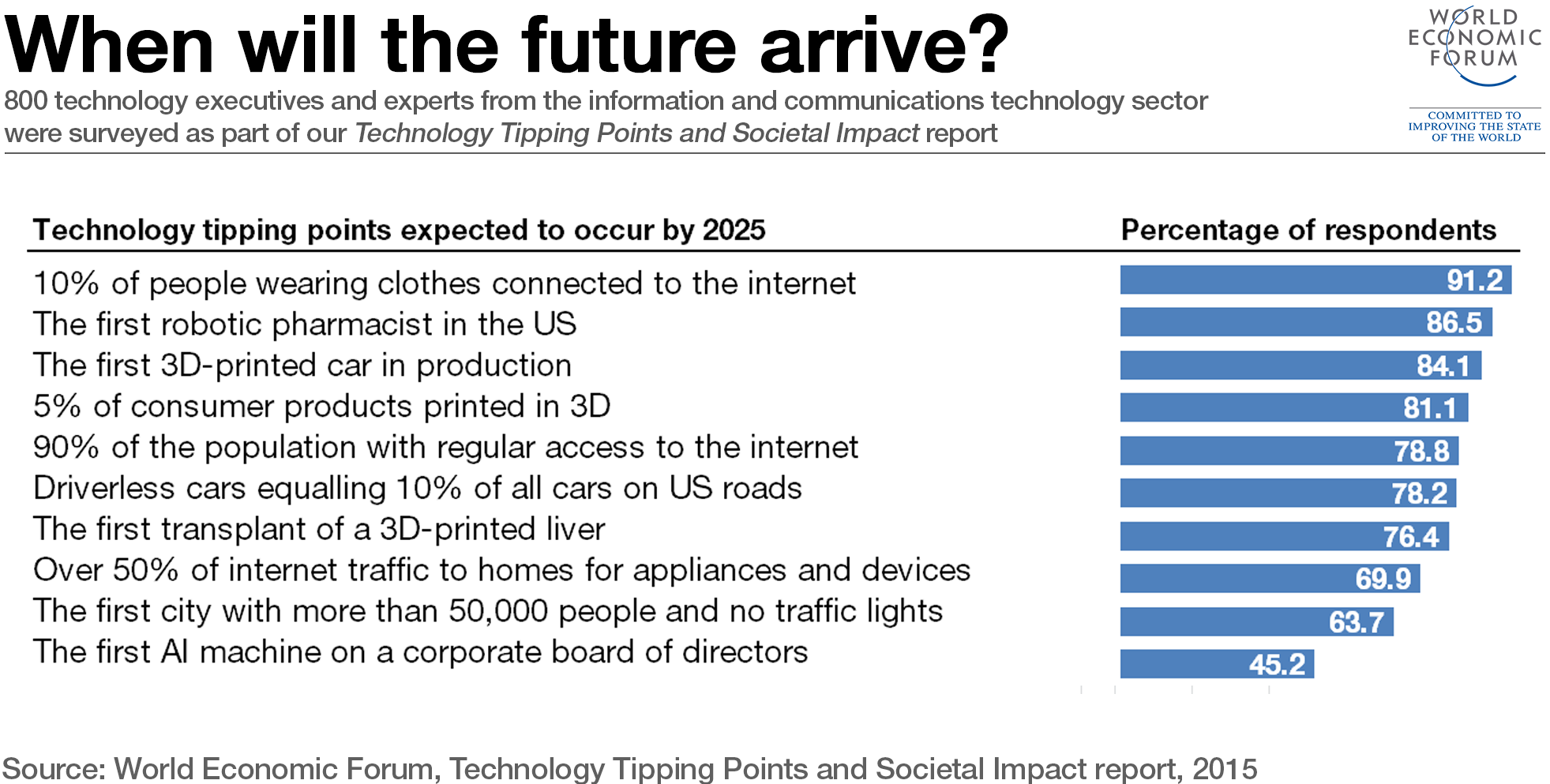Why it's wrong to fear the Fourth Industrial Revolution

Image: Attendees watch a display of 4K OLED televisions at the LG Electronics booth during the 2016 CES trade show in Las Vegas, Nevada January 7, 2016. REUTERS/Steve Marcus
Being born one of the American Millenial Generation poses some interesting problems. My tuition is higher than tuition has ever been and my chances of finding a job are constantly shrinking. Facing tough job prospects, I became interested in the subject of employment and work.
During the previous three Industrial Revolutions, labour markets shifted and people learned new skills that could only be performed by humans. In recent decades, we began to see the first automated assembly lines, McDonalds orders being taken on computers, and now even self-driving cars. In fact, the Whole Foods near my University no longer takes custom food orders in person; rather it has a bay of computers where customers input their orders.

The Fourth Industrial Revolution is unique in that it will render human labour obsolete. This revolution will make finding work incredibly difficult for my generation. The Fourth Industrial Revolution threatens low skill labour and some white-collar jobs as well. Automated robots and artificially intelligent computers can perform physical labour as well as jobs that involve algorithms and organization and they don’t require a wage, health care benefits, and don’t get sick or make mistakes. An Oxford University study estimates that as much as 47% of jobs today have a 75% chance of being automated in the next 20 years. The effects of the Fourth Industrial Revolution will affect every aspect of life and these impacts will be felt in every community.
Although this may seem daunting, it doesn’t have to be. Humanity has always been defined by our battle with scarcity. Since technology of the past was primitive, resources were also scarce and there were never enough resources to satisfy everyone’s needs. The modern concept of work originated out of this condition. Working demonstrated that an individual was a productive, contributing member of society, and therefore, a valuable asset to society deserving of compensation. Those that did not work were seen as lazy and undeserving of resources.
However, technology made production more efficient, a process called "ephemeralization" by R. Buckminster Fuller. Ephemeralization allows us to do “more and more with less and less” until we reach a state of abundance. With the advent of robotics and Artificial Intelligence, we are rapidly approaching a state of abundance. According to a McGill University study, we already produce enough food to feed 10 billion people. We have the technology to harvest energy from nature to provide most of the energy the Earth consumes. Homes are even beginning to be 3D printed. One must ask themselves how technology can be a bad thing if it has provided us such abundance. The problem lies with our concept of work, not technology.

We still cling to our antiquated notion of work, which denies people the resources they need until they prove their worth through work. However, current trends suggest that this Fourth Industrial Revolution is inevitable. Tech companies will not hold back their latest invention to protect the job market and since robotics and Artificial Intelligence will render human labour obsolete, there will be no labour market shift like the last three revolutions. Employers will not continue to hire more expensive human labor for the sake of the economy. We cannot continue to maintain the idea that people must work to earn a living, as soon it will be incredibly difficult to find demand for human workers.
Furthermore, scarcity, from which the idea of work originated, is becoming less and less of a reality. It is becoming possible to provide for all basic human needs through automation. Instead of seeing automation as a threat to one’s decreasing ability to sustain oneself, we must undergo a paradigm shift that views labour automation as an emancipatory action to free humans from menial labour while still striving for abundant production. We must begin to shift towards an access-based economy instead of a restriction-based economy. Everyone deserves to have their basic needs satisfied, not because it’s the right thing to do, but because it is possible to do so. Furthermore, if we continue to maintain our antiquated notion of work, mass unemployment will be inevitable.
Automating work will free our time to pursue our passions and give our lives new meaning. No longer would we have to stress over paying bills, getting up early for work, or catching up on unfinished assignments. Humans will know true freedom when they are not unnecessarily bound by technology and instead served by technology.
We must not continue working for the sake of work. We must not maintain the status quo for sake of maintaining the status quo. There is no reason we can’t imagine a better world. Philosopher Jean-Paul Sartre once described a phenomenon, which he called Bad Faith, in which one would convince oneself of a fiction in order to forget an inconvenient truth, as reckoning with the truth can often be uncomfortable. It seems like society has a bad case of Bad Faith.
All data points to the fact that we are standing in front of a tidal wave of technological unemployment, yet we have yet to have an honest and open discussion about restriction-based economies. Questioning restriction-based economies will reveal the true freedom that an access-based economy will bring.
This article was first published on Medium, as part of the World Economic Forum’s essay contest for Davos 2016. The shortlist will be announced later this week.
Author: Kei Pritsker, Editor of Live x CarpeDiem
Don't miss any update on this topic
Create a free account and access your personalized content collection with our latest publications and analyses.
License and Republishing
World Economic Forum articles may be republished in accordance with the Creative Commons Attribution-NonCommercial-NoDerivatives 4.0 International Public License, and in accordance with our Terms of Use.
The views expressed in this article are those of the author alone and not the World Economic Forum.
Stay up to date:
Fourth Industrial Revolution
Forum Stories newsletter
Bringing you weekly curated insights and analysis on the global issues that matter.
More on InnovationSee all
Awais Ahmed and Srishti Bajpai
November 11, 2025







